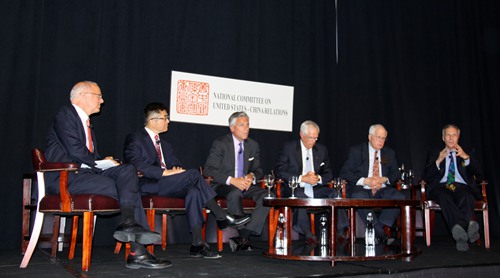|
 |
|
The National Committee on US-China Relations brings together five former ambassadors at the New York Stock Exchange to share their views on China-U.S. relations on May 21. From left: committee President Stephen Orlins, former ambassadors Gary Locke, Jon M. Huntsman Jr., Joseph Prueher, J. Stapleton Roy (LI PING) |
"Obviously it is a benefit but it is more important to understand the culture and the history of the Chinese to understand their views and put yourself in their shoes," Locke said. "For me, I thought it was a benefit that I did not speak Mandarin because the expectations of the Chinese people were that I, as a Chinese-American, I would actually take the side of the Chinese in interactions as ambassador," said Locke.
Huntsman lavished praise on the number of Chinese who speak fluent English, saying that it puts the U.S. at "a disadvantage" at the negotiating table. China is "light-years ahead" of the U.S. in training future leaders to speak English and other foreign languages.
Looking ahead
The former diplomats also gave their advice for the newest U.S. ambassador to China: Max Baucus. All of the ambassadors spoke highly of his dedication to the posting and his efforts to further the relationship between China and the U.S. Any ambassadorship comes with its share of challenges, as the line between official capacity and natural good will can be blurry.
"Don't suffer from 'clientitis'. It's not the job of the U.S. ambassador to be popular in the host country, it is their job to convey the views of the U.S. Government," said Winston Lord, ambassador from 1985 to 1989. "Red lines are important. Try to understand what each country's red lines are."
Baucus is stepping into what is the most important diplomatic role in Asia to the U.S., and perhaps the world, the ambassadors commented.
"China's relations with all the countries of the region are very important in terms of U.S. foreign policy and therefore I encouraged [Ambassador Max Baucus] to focus not simply on U.S.-Sino relations because no other U.S. ambassador in Asia can provide that overview of how trends in that region are moving," said J. Stapleton Roy, U.S. ambassador from 1991-1995. "Our embassy and our ambassador, because of the importance of all these relationships have the ability to look at the big picture. There's not many in Washington with that ability."
Huntsman advised the new ambassador to "set priorities and keep everyone on the same page," as trade issues will continue to dominate relations in the next few years.
"You'll be remembered not for 100 things – because nobody can do that – but for two or three things. Do what you do best because each of us brought a certain background to the job," Huntsman said, advising Ambassador Baucus to open up animal husbandry markets, to finish the bilateral trade agreement and to use his connections on Capitol Hill to introduce members of Congress to Chinese officials.
Perspectives from Former U.S. Ambassadors to China
Winston Lord (1985-1989)
J. Stapleton Roy (1991-1995)
Joseph W. Prueher (1999-2001)
Jon M. Huntsman, Jr. (2009-2011)
Gary Locke (2011-2014)
Watch the five former U.S. ambassadors to China ring the closing bell of the New York Stock Exchange: https://www.youtube.com/watch?v=vA_ImMsVo0o
Hear audio portions of the ambassadors reflect on 35 years of U.S.-China Diplomatic Relations, sponsored by the National Committee on United States-China Relations:
The author is a contributing writer to Beijing Review, living in New York City | 